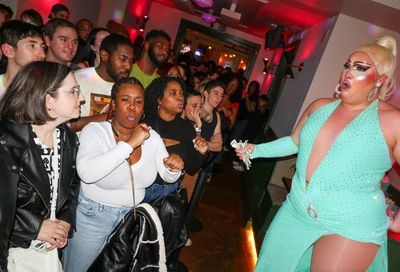Supreme Court to Rule on Case Involving Transgender Asylum Seeker
Lawyers for Estrella Santos-Zacaria claims she faces "imminent danger" if she can't appeal an immigration judge's ruling.

Last week, the U.S. Supreme Court heard a case involving a transgender woman from Guatemala who is seeking asylum, claiming her life is potentially in danger due to her gender identity.
Estrella Santos-Zacaria, 33, first fled Guatemala for the United States as a teenager after suffering multiple sexual assaults, death threats, regular harassment, and discrimination. Following the attack, she lived in Mexico for a few years, unlawfully entering the United States several times.
She was deported to Guatemala in 2008 and again in 2012. In 2018, she entered the United States again, was detained, but this time tried to seek asylum, arguing she would be persecuted due to her gender identity if deported once more. But despite finding her account of the harms she suffered “credible,” an immigration judge denied her application on the grounds that she did not provide sufficient evidence proving she had faced persecution due to her transgender status, and, as a result, was not entitled to a presumption that she would face future persecution, reports Law & Crime.
The immigration judge based their findings on Santos-Zacaria’s acknowledgment that Guatemalan attitudes towards the LGBTQ community have changes over the years, particularly in large cities. But her lawyers objected to the ruling, calling it “inexplicable” that the court would acknowledge the assault she suffered but refuse to find that would face future risk if deported once again.
Santos-Zacaria then appealed to the Board of Immigration Appeals, which reversed some of the lower court’s findings, declaring that she had indeed established evidence of past persecution. But the BIA also found that she had failed to properly establish future risk of persecution. Her lawyers argued that the BIA should have remanded the case back to the lower court, rather than issuing its own findings of fact.
Santos-Zacaria subsequently appealed to the 5th U.S. Circuit Court of Appeals, which ruled 2-1 that it did not have proper jurisdiction over the case, because Santos-Zacaria should have filed a motion for reconsideration with the BIA rather than appealing to the circuit court. She subsequently appealed to the U.S. Supreme Court, which heard oral arguments concerning whether the courts have jurisdiction to hear the case and over technical issues related to immigration procedure.
The Biden administration has argued that federal judges shouldn’t insert themselves into the case because Santos-Zacaria failed to exhaust other administrative appeals available to her at the time. Immigration authorities have argued that they should have broad discretion over their decisions without fearing judicial interference. In court last Wednesday, Solicitor General Yaira Dubin warned that allowing the 5th Circuit to review Santos-Zacaria’s immigration appeal would lead other asylum seekers to follow her lead and would inundate courts with various appeals of deportation orders.
A group of legal services advisors backing Santos-Zacaria have argued that requiring applicants for asylum to file additional appeals for reconsideration within the immigration system will only further add to the backlog of asylum cases, reports ABC News.
The high court is expected to issue a ruling, largely focusing on the technical aspects of the case and Santos-Zacaria’s ability to appeal, sometime in the spring.
More than 283,000 migrants applied for asylum to enter the United States between 2018 and 2020, according to data from the U.S. Department of Homeland Security, with onlt about 11% of those requests ultimately being granted.
As ABC News noted, a 2021 study by the Williams Institute at the UCLA School of Law found that an estimated 30,900 LGBTQ people applied for asylum in the United States between 2012 and 2017, with nearly 4,000 seeking asylum due to fear of persecution based on their sexual orientation or gender identity. Most of those were natives of El Salvador, Guatemala and Honduras.
Santos-Zacaria, who was deported to Mexico in 2019, has faced ongoing challenges since being denied asylum, according to a sworn affidavit submitted by her legal team. For example, she was recently beaten at a bus stop by three people and, a few months earlier, she was bludgeoned until she lost consciousness at her workplace, according to the affidavit. Her lawyers have argued that unless the courts take up her appeal of the immigration ruling, she faces “imminent danger.”
“I am constantly living in fear wondering who will try to attack me next,” she wrote in the affidavit. “I desperately need your permission to return to the U.S. where I can live safely while my case is processing.”
Support Metro Weekly’s Journalism
These are challenging times for news organizations. And yet it’s crucial we stay active and provide vital resources and information to both our local readers and the world. So won’t you please take a moment and consider supporting Metro Weekly with a membership? For as little as $5 a month, you can help ensure Metro Weekly magazine and MetroWeekly.com remain free, viable resources as we provide the best, most diverse, culturally-resonant LGBTQ coverage in both the D.C. region and around the world. Memberships come with exclusive perks and discounts, your own personal digital delivery of each week’s magazine (and an archive), access to our Member's Lounge when it launches this fall, and exclusive members-only items like Metro Weekly Membership Mugs and Tote Bags! Check out all our membership levels here and please join us today!


























You must be logged in to post a comment.